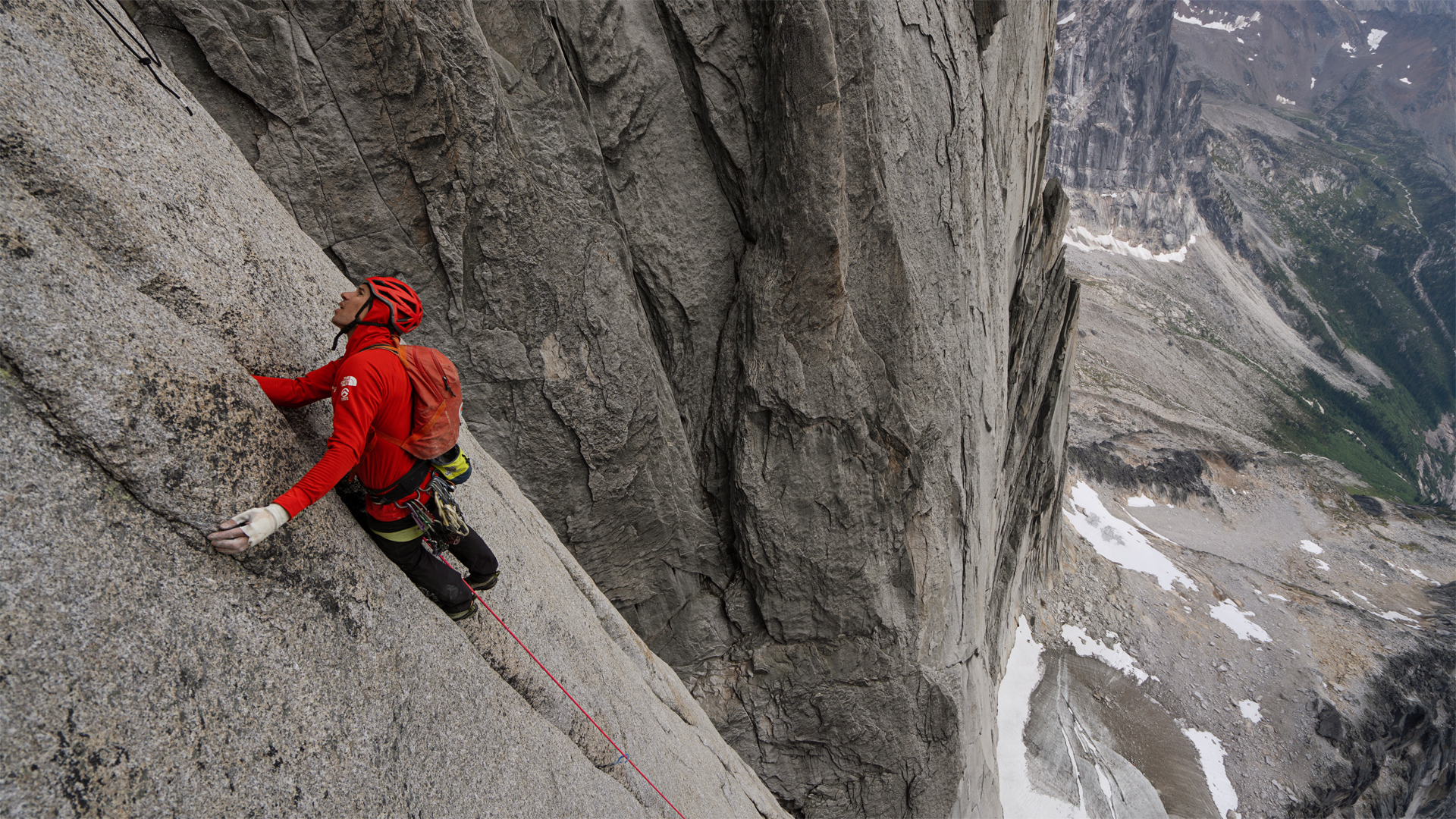The best road running shoes: hit the streets at speed
Hit the ground running with a pair of the best road running shoes, put to the test by our expert team
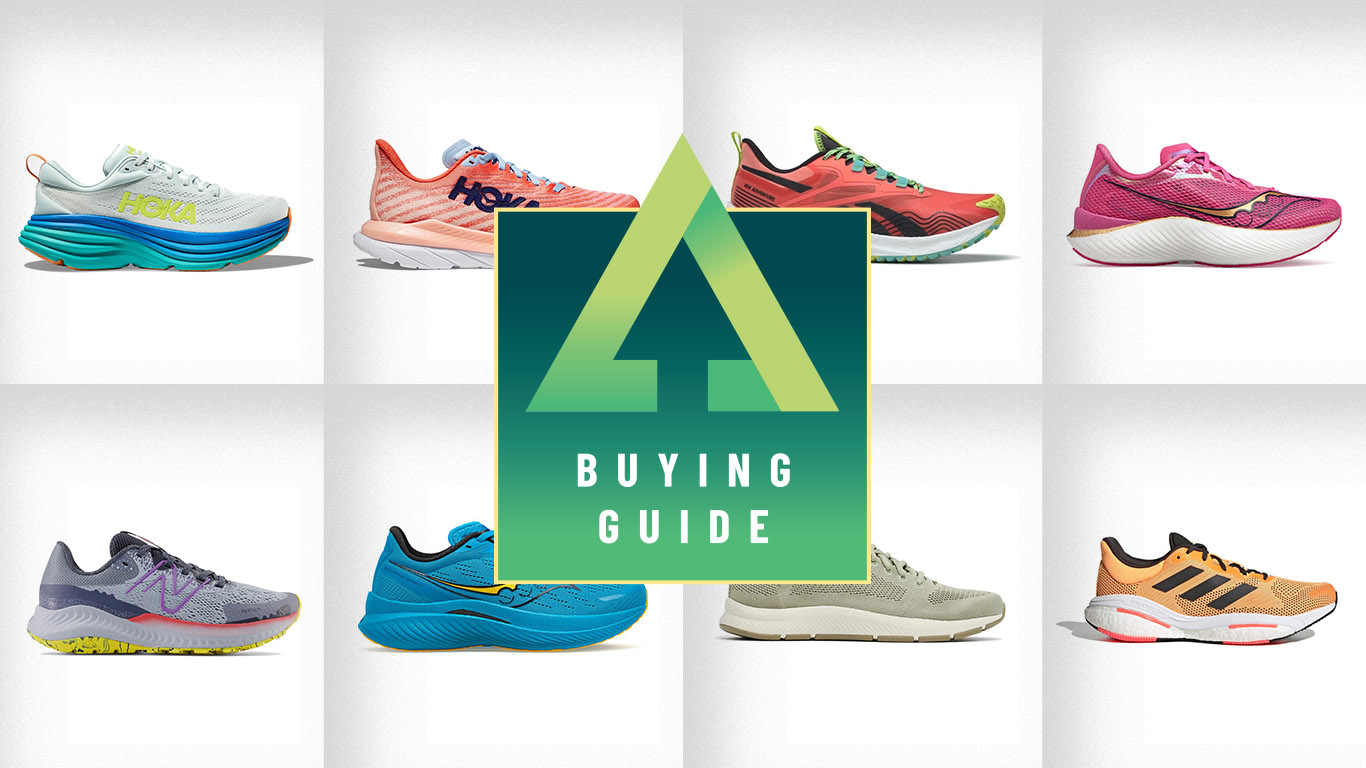
The best road running shoes are lighter and faster than ever, with some leading models providing a competitive advantage on race day. However, those of us who pound the tarmac several times a week will also need training shoes that are durable enough to cope with our regimes.
So, the best road running shoes aren’t just the fastest, but also the most comfortable and hard-wearing for mile after mile. To bring you this guide, we’ve laced up for training runs, 10ks, parkruns and longer Sunday outings and ultras putting each pair well and truly through their paces.
Of course, at Advnture, we’re gluttons for a bit of off-road running too. However, in this guide we’re concerned with road running alone. Check out our guide to the best trail running shoes for pairs that’ll grip mud and conquer mountains.
Where tarmac is concerned, we rate the Hoka Solimars and the Hoka Mach 5s as the best everyday pairs of road running shoes and we kick off our guide with these excellent pairs.
The quick list
This is the quick list, a snapshot of the best road running shoes available in 2025. To delve deeper into the features and qualities of each featured pair, see our more detailed reviews further down the page in this guide.
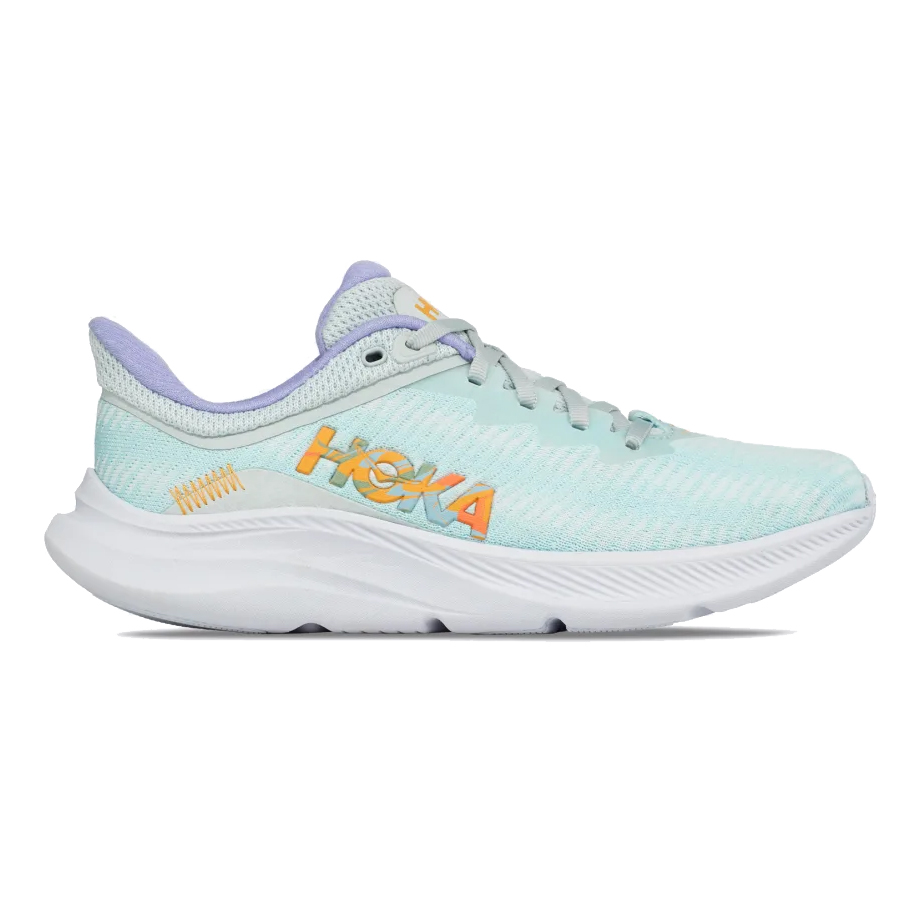
With its understated Metarocker shape, modest cushioning and roomy toebox, the firm Hoka Solimar is a great everyday running shoe
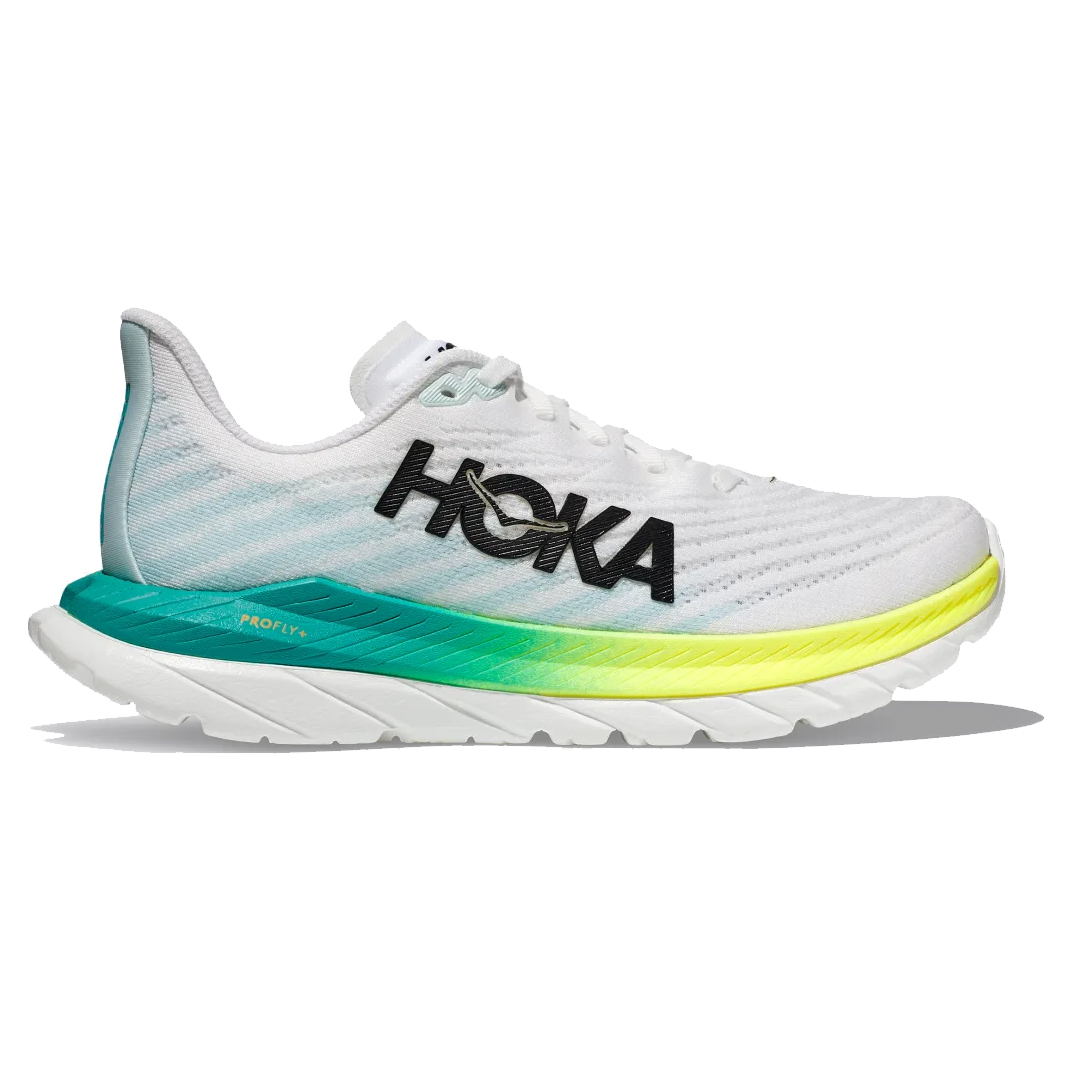
Snug and secure fitting, the Hoka Mach 5s provide a smooth motion-controlled ride thanks to a soft and responsive midsole foam
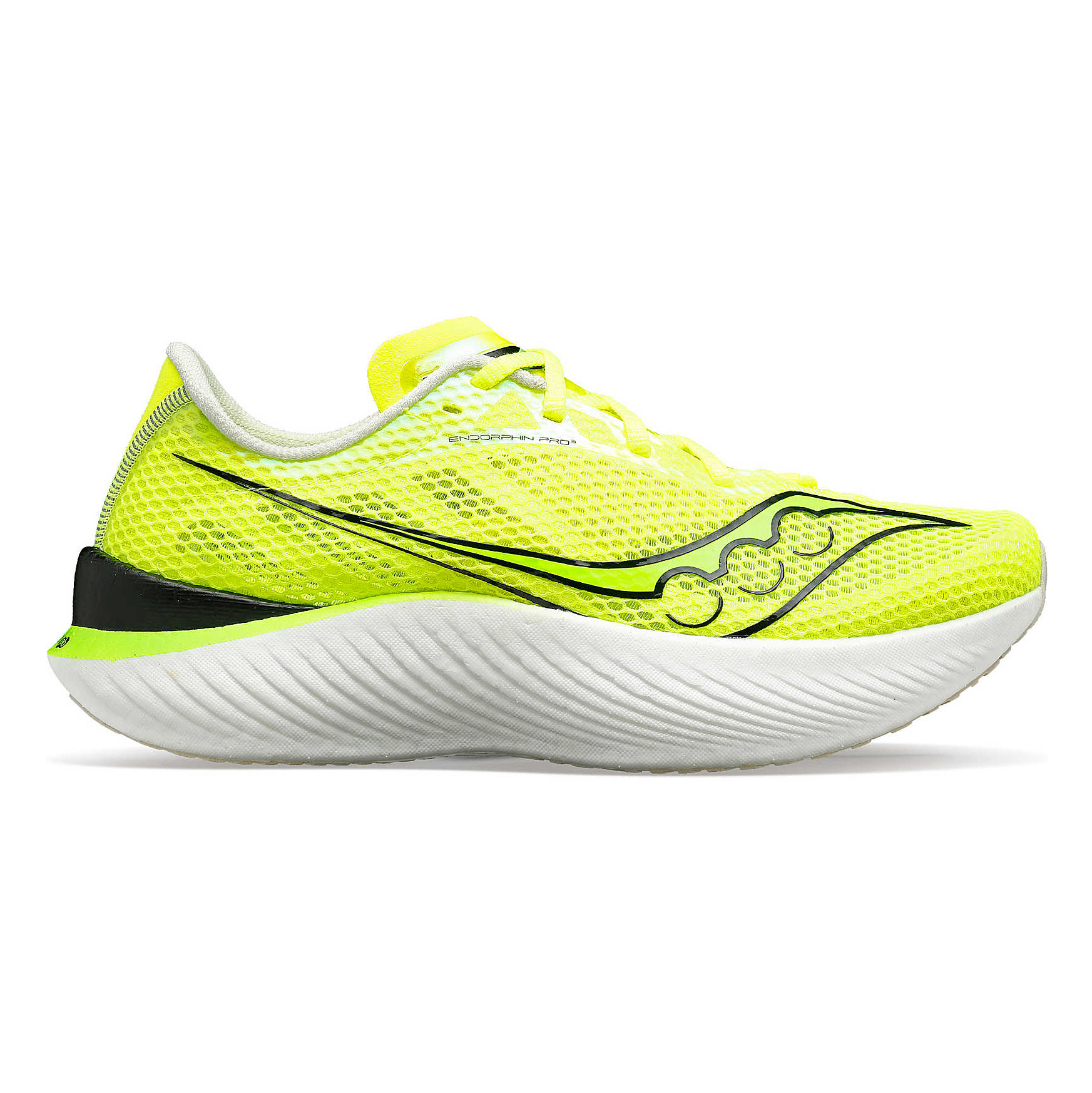
Lightweight, springy and responsive, the high breathable Saucony Endorphin Pro 3s are our go-to for race days, when speed is the order of the day
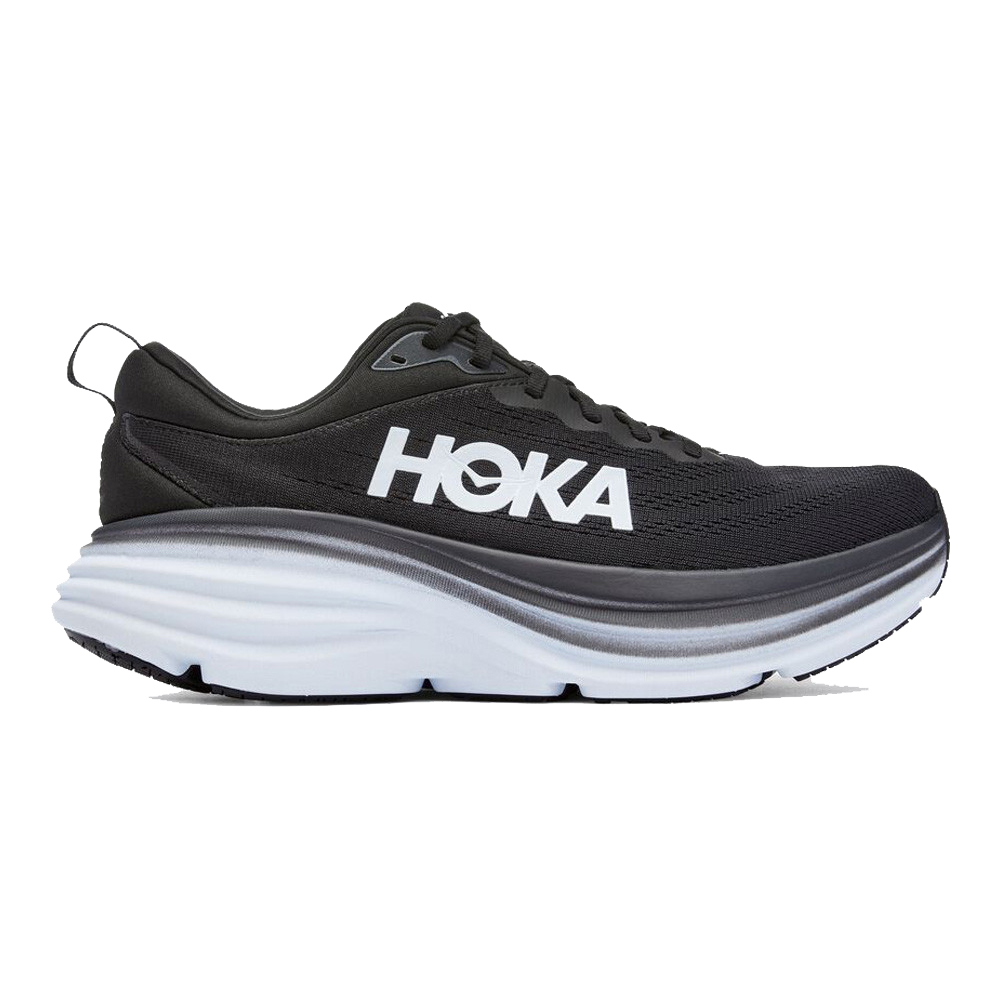
These maximalist running shoes give a comfortable and spacious fit, have an extra breathable upper and provide solid grip in wet conditions
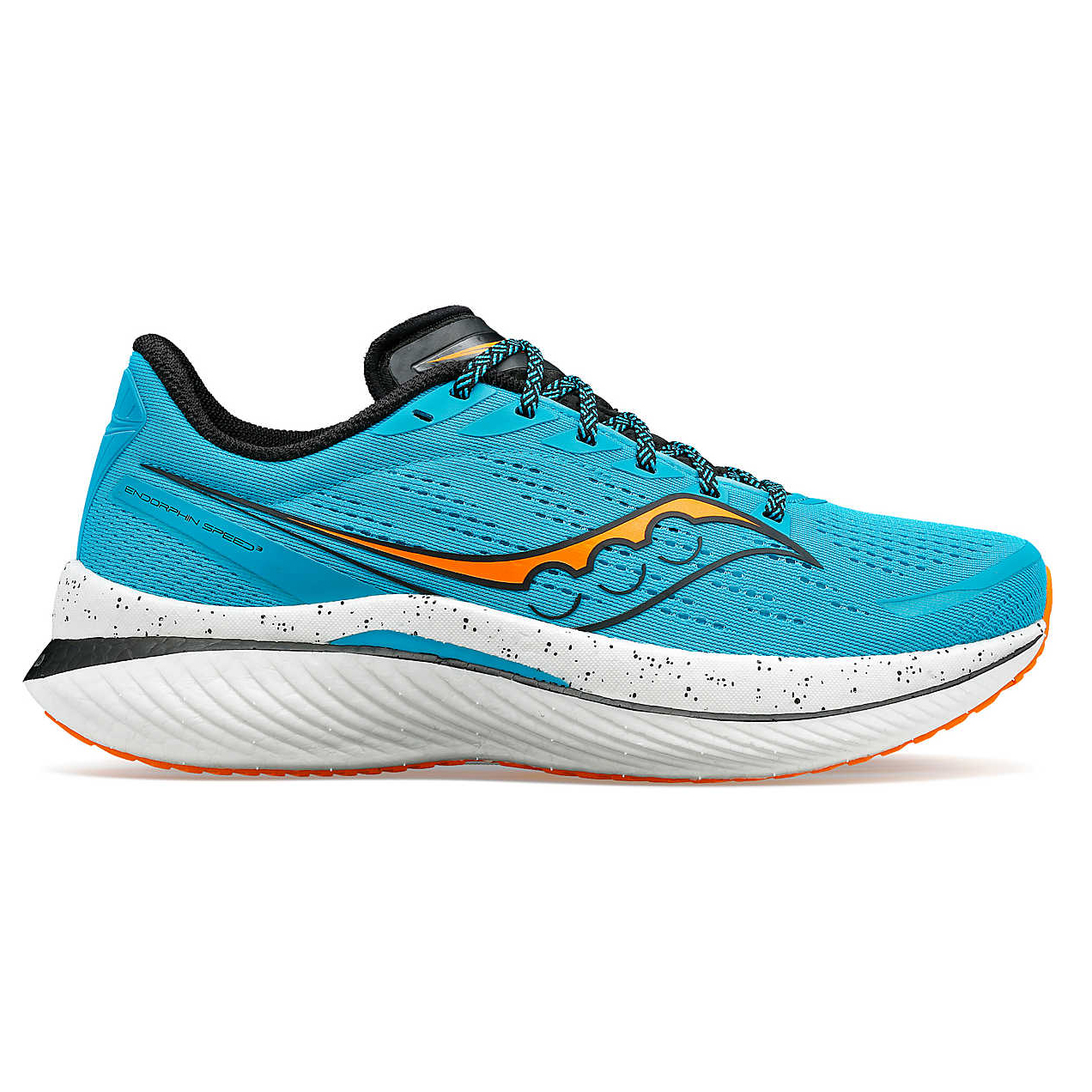
The lightweight and airy Endorphin Speed 3 is springy and responsive, while being more affordable than carbon-plated race shoes
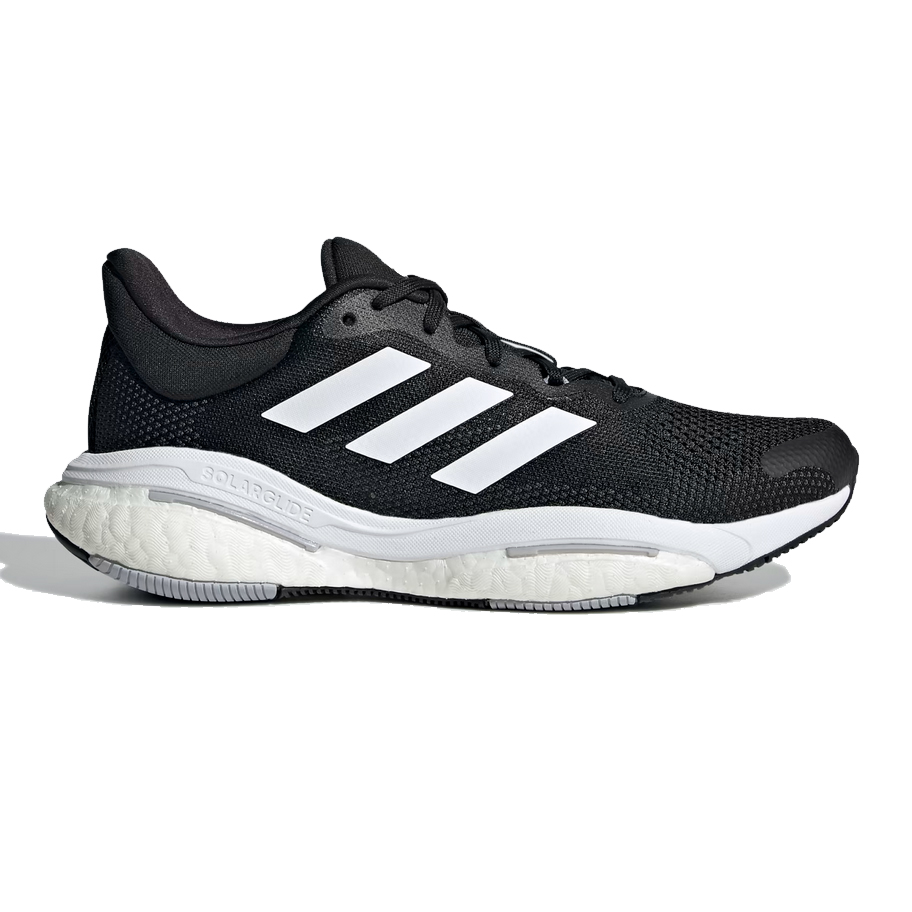
The Solarglide 5s have a very stable feel, while the well cushioned midsole provides a responsive and springy ride
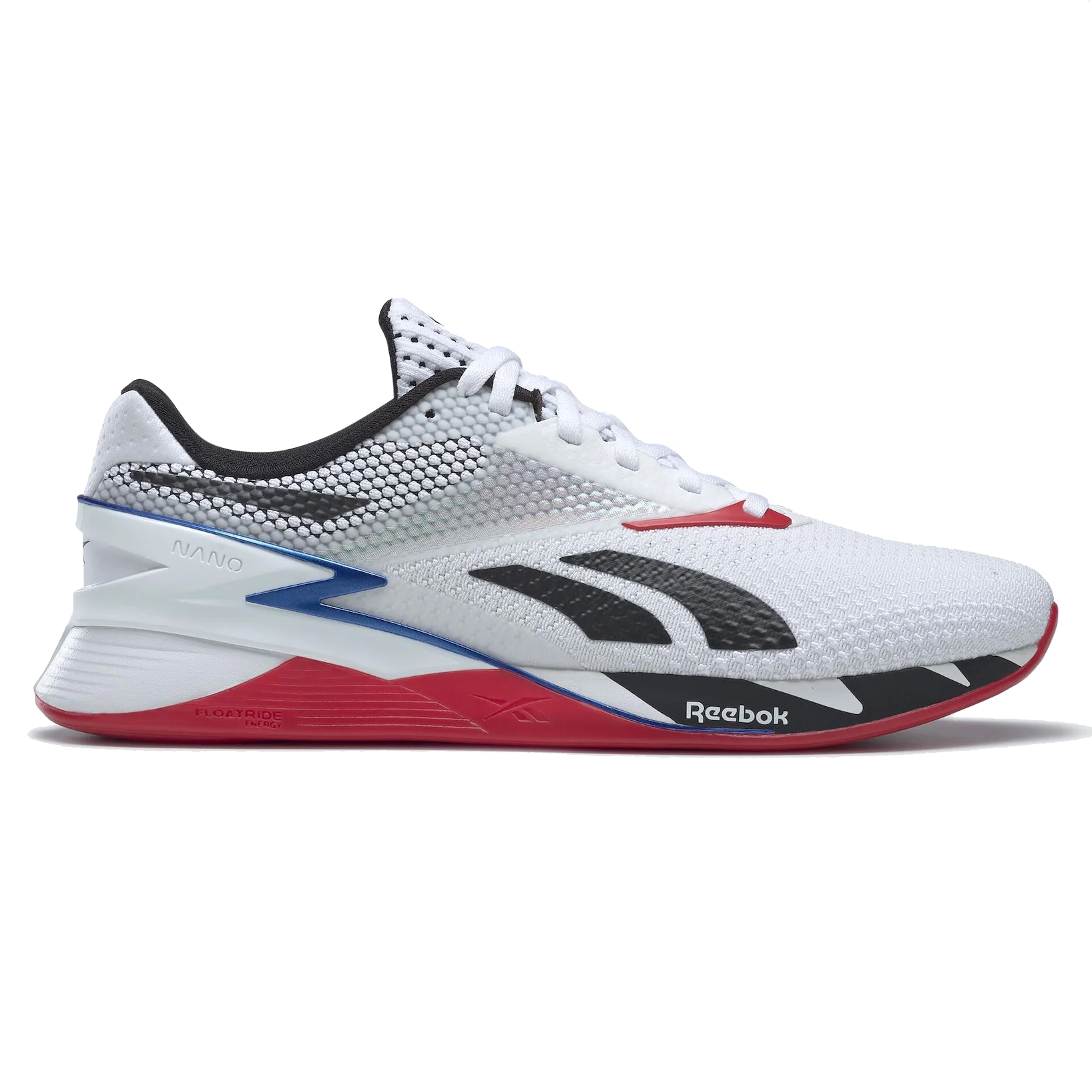
Suited to gym workouts and short runs, these stable and comfortably padded shoes from Reebok and a great, reasonably priced option
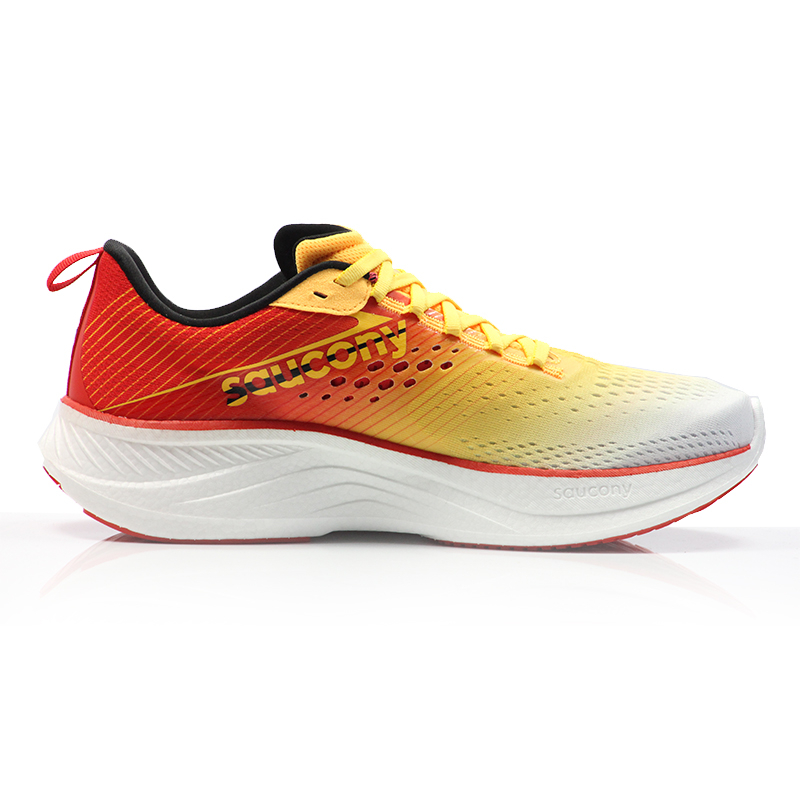
The Ride 17 is a super versatile shoe, which our reviewer has thoroughly enjoyed using for marathon training thanks to its soft, bouncy cushioning and satiny sock liner.
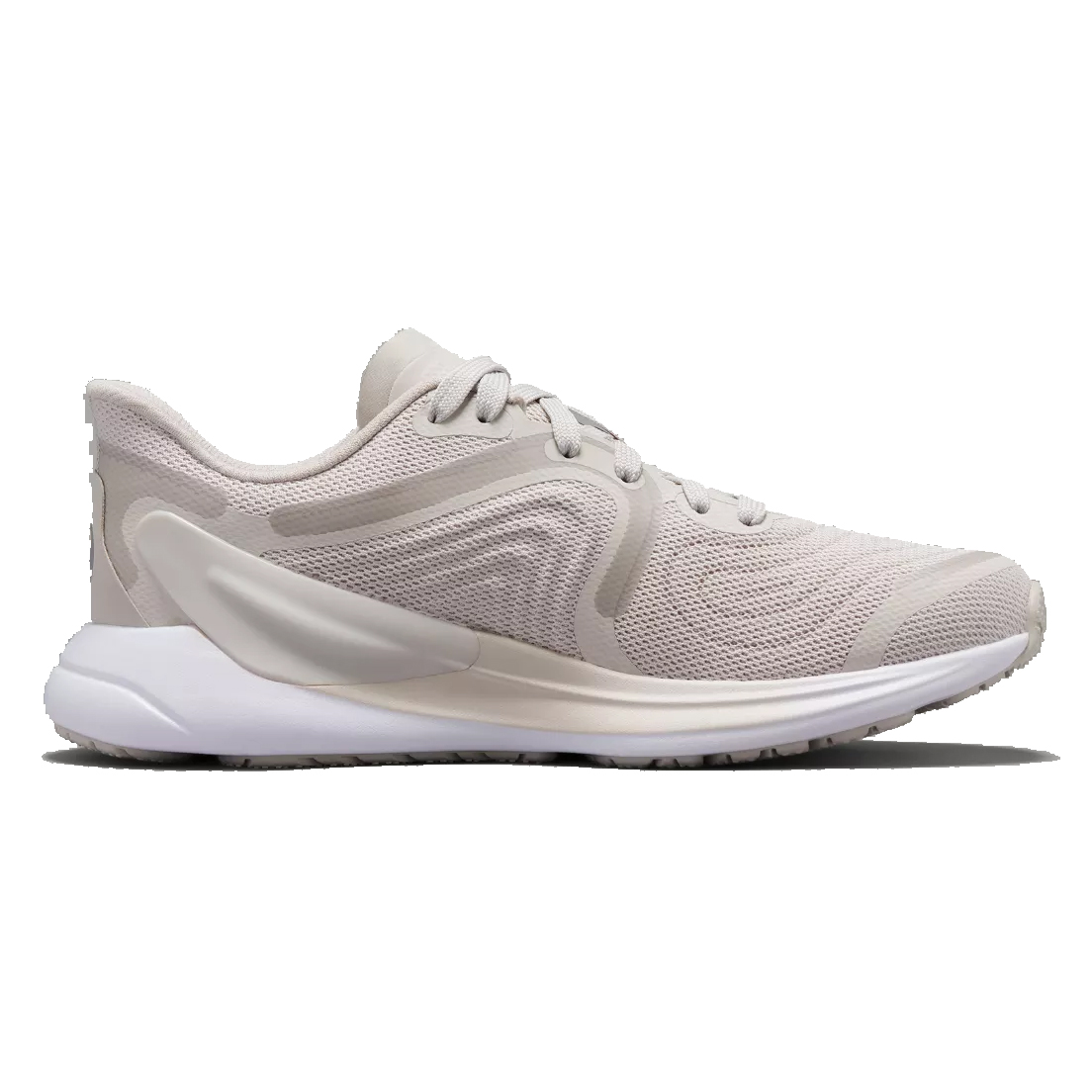
Engineered for heel strikers, the Blissfeel 2 provides solid arch and midfoot support and fits true to size, featuring a soft and breathable upper
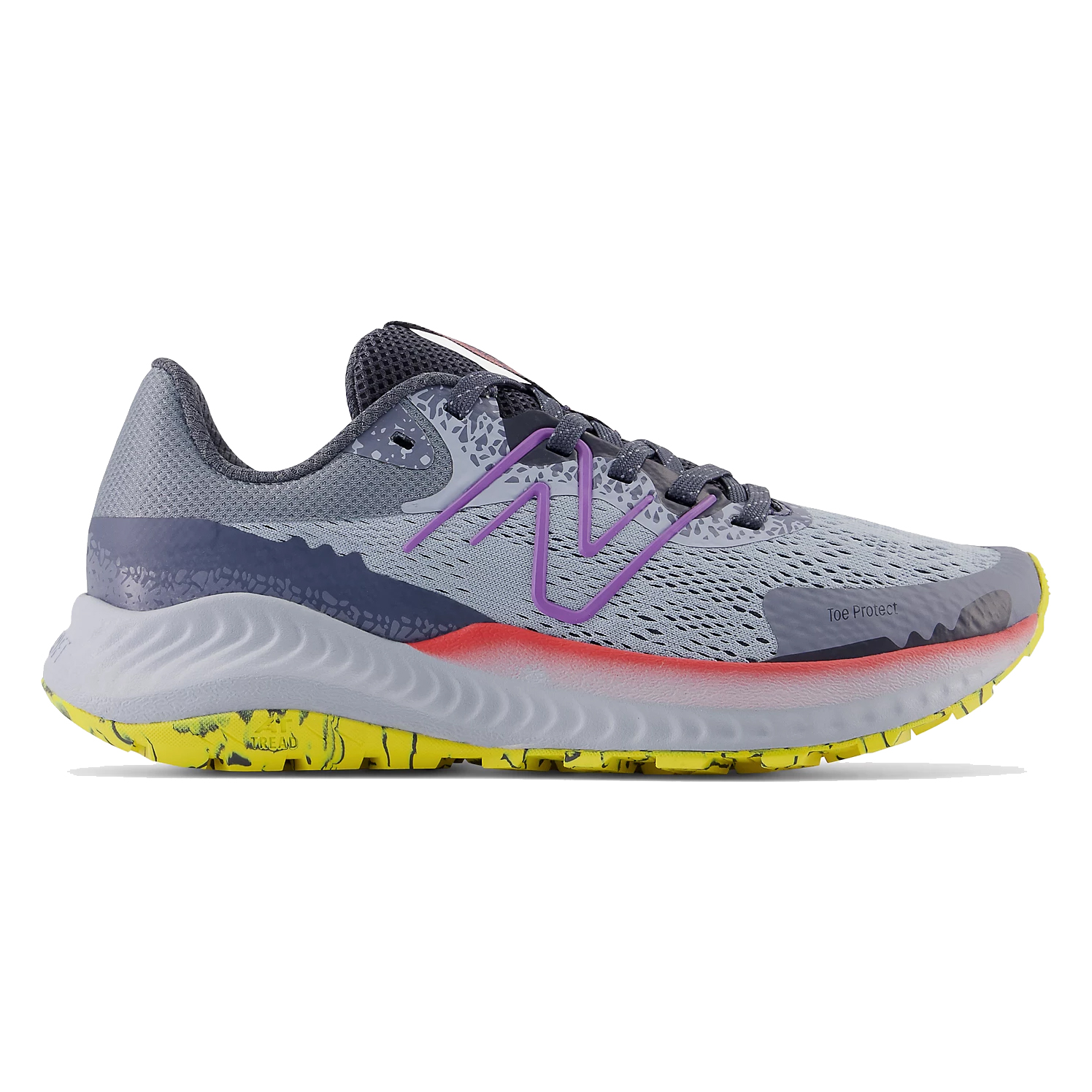
The well-priced Dynasoft Nitrel V5 provides a bouncy and responsive ride and comes with standard and wide fit options
The best road running shoes in 2025
You can trust Advnture
The best road running shoe overall
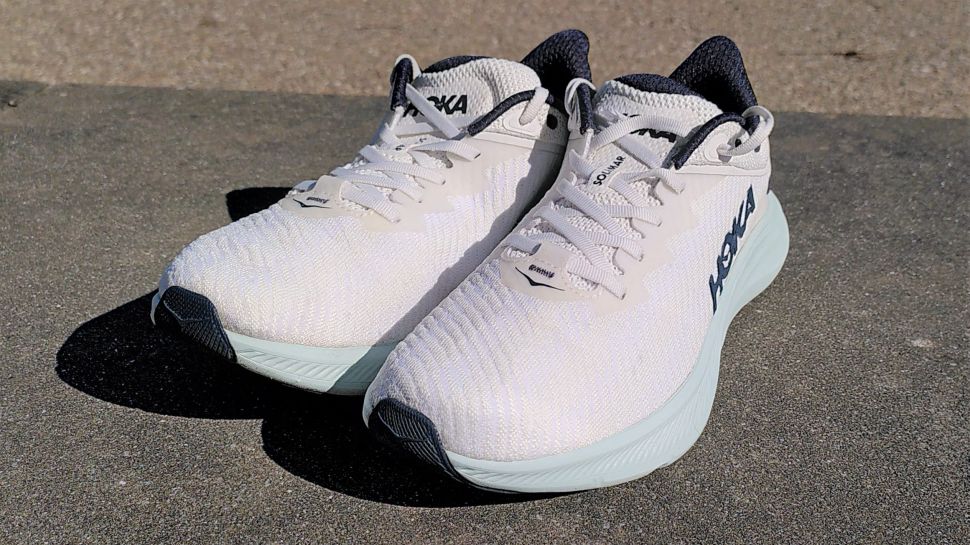
Specifications
Reasons to buy
Reasons to avoid
We found the Hoka Solimar to be a great all-rounder with its toned-down Metarocker shape and modest cushioning that make it ideal for mid and long-distance races and training sessions. It also works well for gym work (provided you're not hitting the weights) and for long days of walking. If you're only going to buy one pair of sports shoes, it's an excellent affordable option.
The Solimar is a neutral, lightweight road running shoe for everyday training, and is essentially a toned-down version of Hoka's usual heavily-cushioned designs. It certainly isn't lacking padding, but it's less exaggerated than some of the company's designs. If you're not used to thick foam, or feel unbalanced running on inches of padding, we think it's a good compromise.
"They have been supremely comfortable from day one," said our run leading tester. The midsole isn't bulky, but is extended just to create a larger 'crash pad' to absorb heavy heel strikes and provide extra stability, and there's a modest 6mm heel drop.
Read our full Hoka Solimar review
The best road running shoe for cushioning
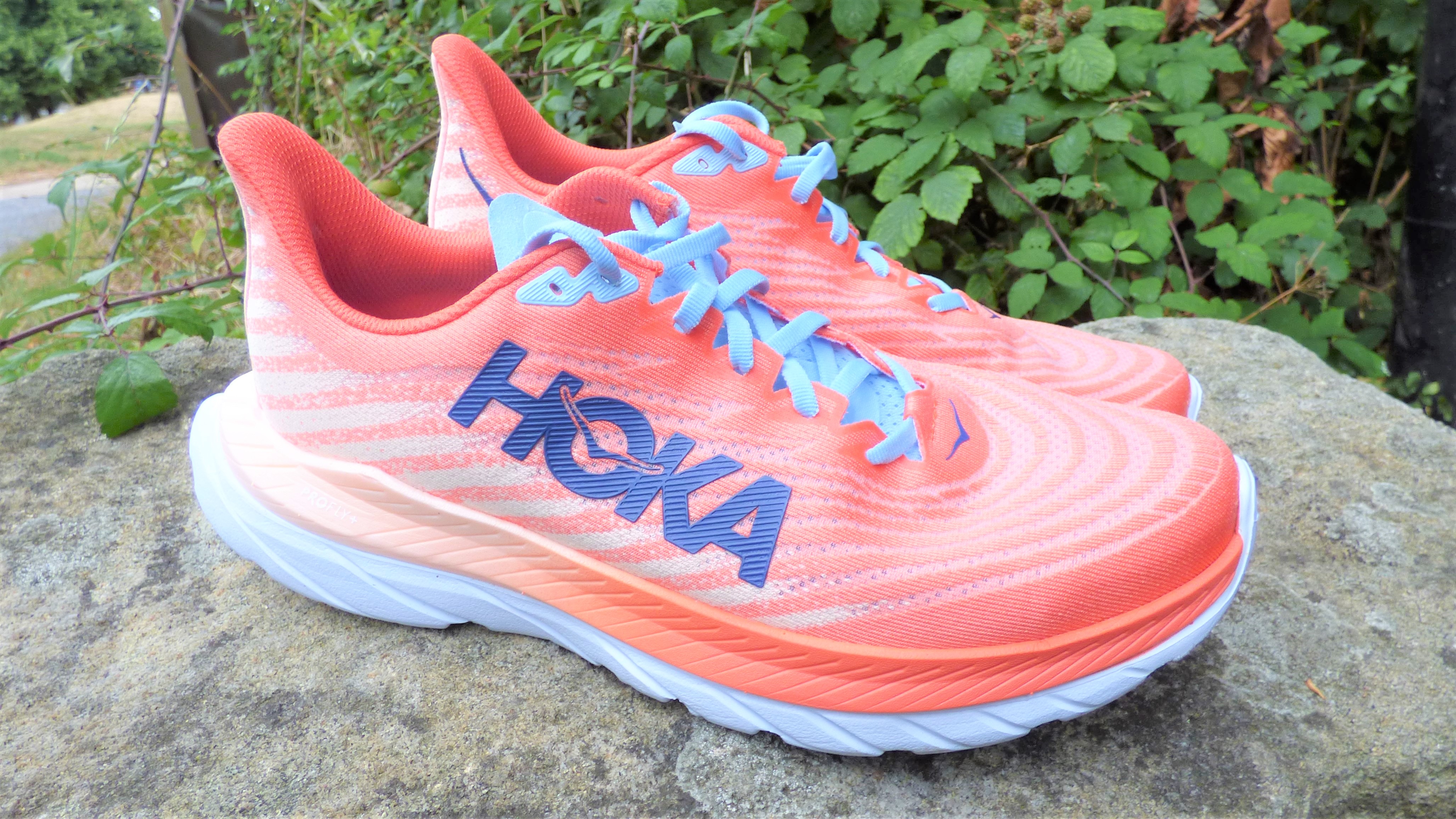
Specifications
Reasons to buy
Reasons to avoid
If you're looking for a dependable road running shoe that will serve you well for everyday training and mid-distance races, the Hoka Mach 5 is the one for you. During testing we were particularly impressed by its upper, which provides a fit that's snug and secure without sacrificing breathability, and includes a well engineered collar that minimizes ingress of dirt and stones on loose surfaces.
Like most Hoka shoes, the Mach 5 is built with heel strikers in mind. Although it doesn't have the outsized sole of some of the brand's shoes, it does have a slight swallowtail encouraging your foot to roll in a controlled manner through to toe-off.
The outsole provides plenty of grip in wet conditions, even on slick surfaces, and after putting in plenty of miles there were no signs of premature wear. "This is a great all-rounder for any kind of training session," said our in-house run leader. If you're only planning to pick up one pair of road shoes, this is our top recommendation.
Read our full Hoka Mach 5 review
The best road running shoe for racing
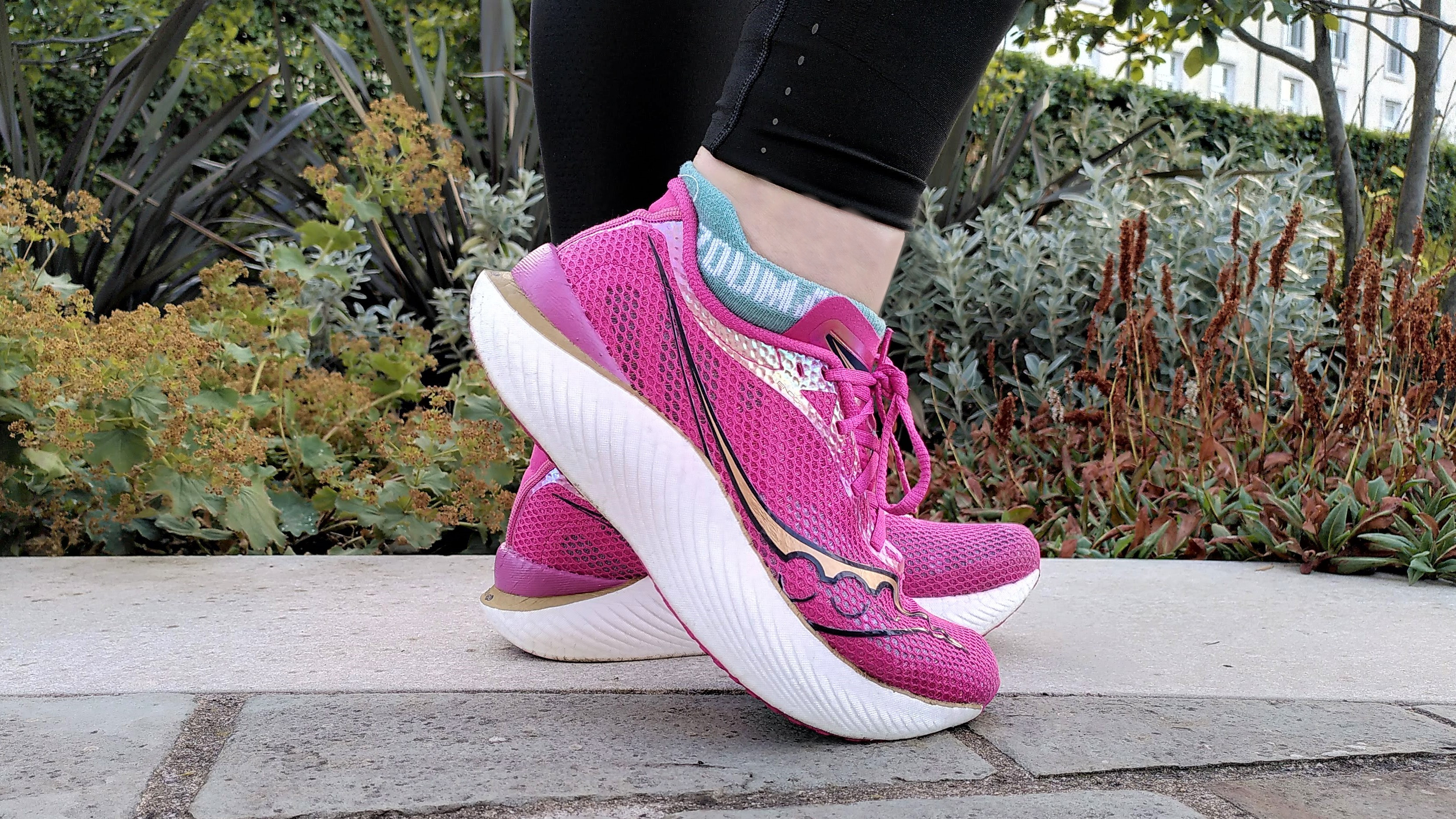
Specifications
Reasons to buy
Reasons to avoid
The Saucony Endorphin Pro 3s are enormously entertaining to run in, and if you want to shave a few seconds off your 5km or 10km personal best, this could be the shoe to help you do it. The magic is in the S-shaped carbon plate hidden away in that thick midsole foam, which makes the Endorphin Pro 3 stiff and springy, with great energy return. In tests we particularly enjoyed wearing it for powering up hills. It boasts even thicker cushioning than the Endorphin Pro 2, which was noticeable on test and makes these even more comfortable to run in.
It's easily one of the lightest road running shoes we've ever tested, and its upper is made from two layers of fine mesh, but it still feels secure and comfortable. It's extremely breathable too; you'll feel the breeze blowing straight through your socks.
Like most Saucony road shoes, we found that the Endorphin Pro 3 came up a little small, so we'd recommend going up half a size. We wouldn't recommend it for everyday use, either; there's a lot of exposed foam, which could be susceptible to damage if you're regularly putting in long miles. One to keep for speed sessions and race days. All in all, they're "fantastic fun" according to our expert run leader.
Read our full Saucony Endorphin Pro 3 review
The best maximalist road running shoe
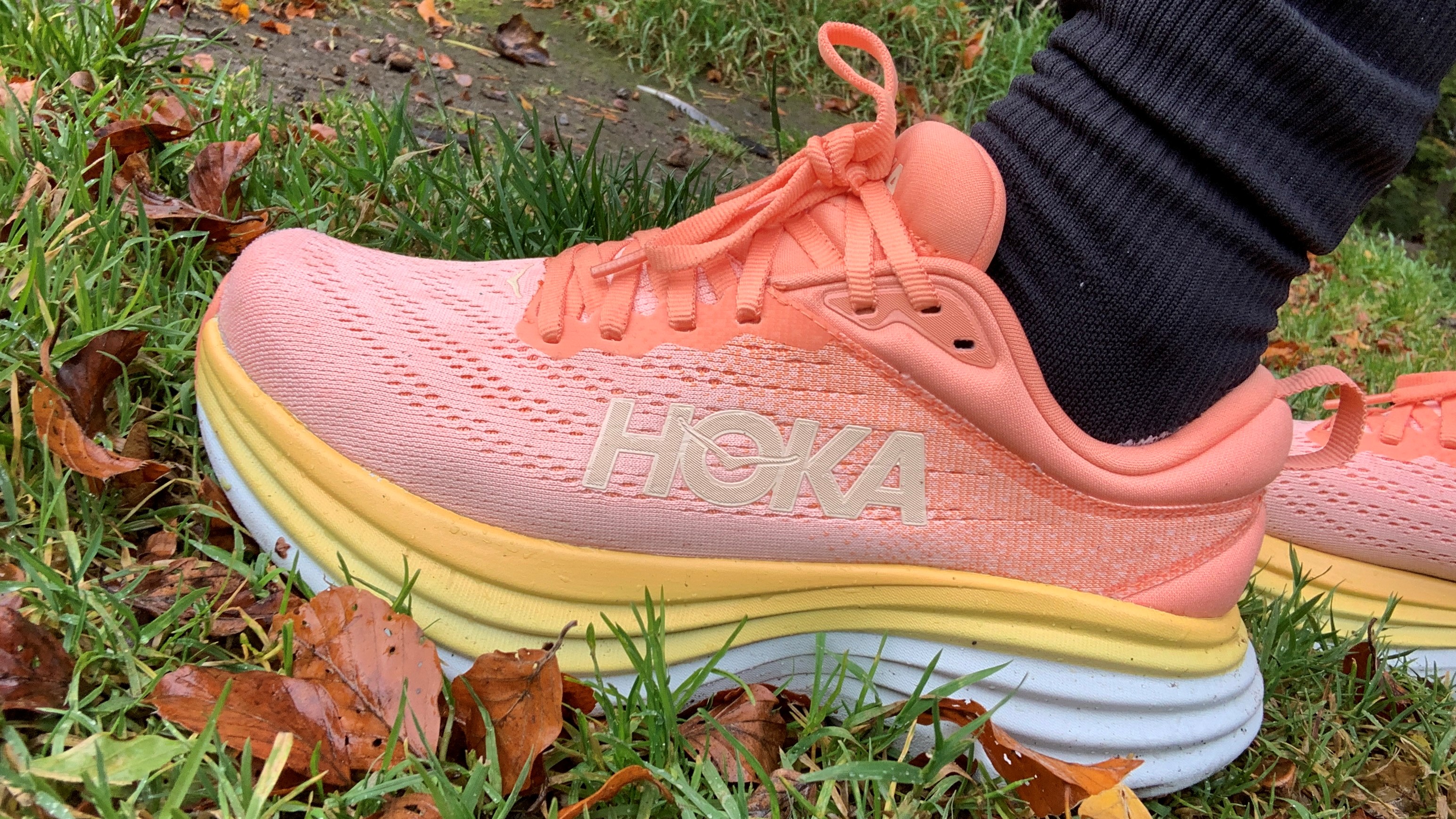
Specifications
Reasons to buy
Reasons to avoid
The Hoka Bondi 8 is big, bouncy, and great for soaking up shocks during longer runs. It's heavier than most, but if you're looking for a maximalist shoe then it's a great option.
We found the Bondi 8's upper feels slightly roomier than that of the Bondi 7, which we found eliminated the problem of rubbing, and the foam is softer and lighter than that of earlier models. During tests, we were also particularly impressed by the grip provided by the Durabrasion rubber outsoles, which give you extra purchase on wet surfaces.
Some may find the thick, soft midsole foam feels unstable, particular when running at lower speeds, so it's worth taking a pair for a test run at your local running shop if possible, but if you like your shoes with bounce then we think you'll be pleased. Plus, on the comfort front, they're certainly plush, with our run expert saying that she "honestly can't think of a better word".
Read our full Hoka Bondi 8 review
The best affordable race shoe
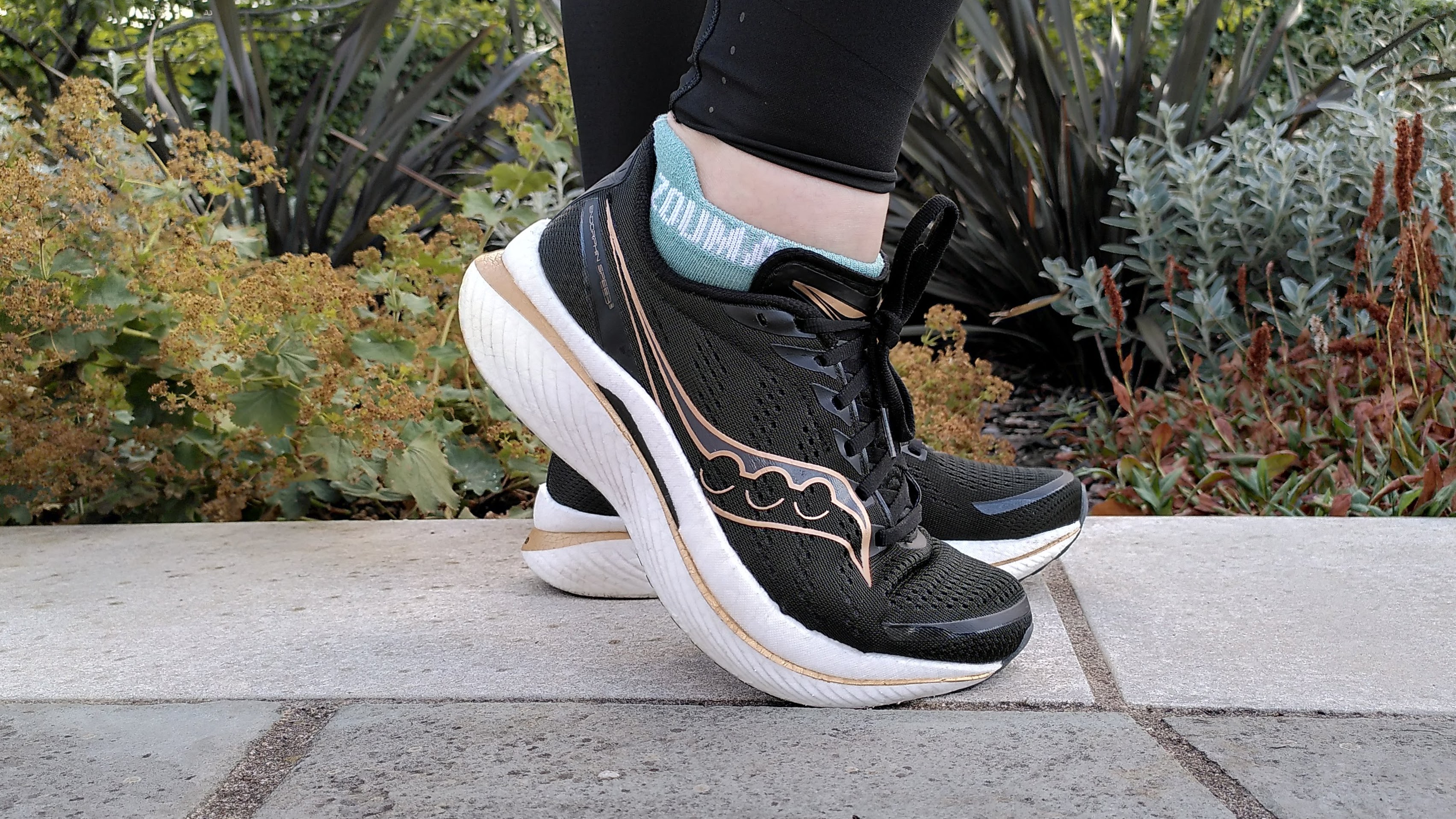
Specifications
Reasons to buy
Reasons to avoid
The Saucony Endorphin Speed 3 gives you most of the benefits of a carbon plate running shoe, without the price tag. Rather than carbon, it has a slice of stiff nylon inside the midsole. The result is a shoe that's not quite as feather-light as the Endorphin Pro 3, but nearly as springy.
Overall, we found it a very likeable shoe that performs well in most situations, and will serve you well for training sessions and race days alike (provided there's no off-roading involved - there's a lot of exposed foam here). The upper is minimalist, but there's just enough padding in the collar and tongue to keep things comfortable and prevent the laces digging into your metatarsals.
If you've fallen out of love with running lately, this could be the shoe that rekindles your love for the sport – it's "fast, fun and likeable" according to our run-leading expert. Just beware Saucony's slightly small fitting and be prepared to go up half a size for comfort.
Read our full Saucony Endorphin Speed 3 review
The best road running shoe for midfoot strikers
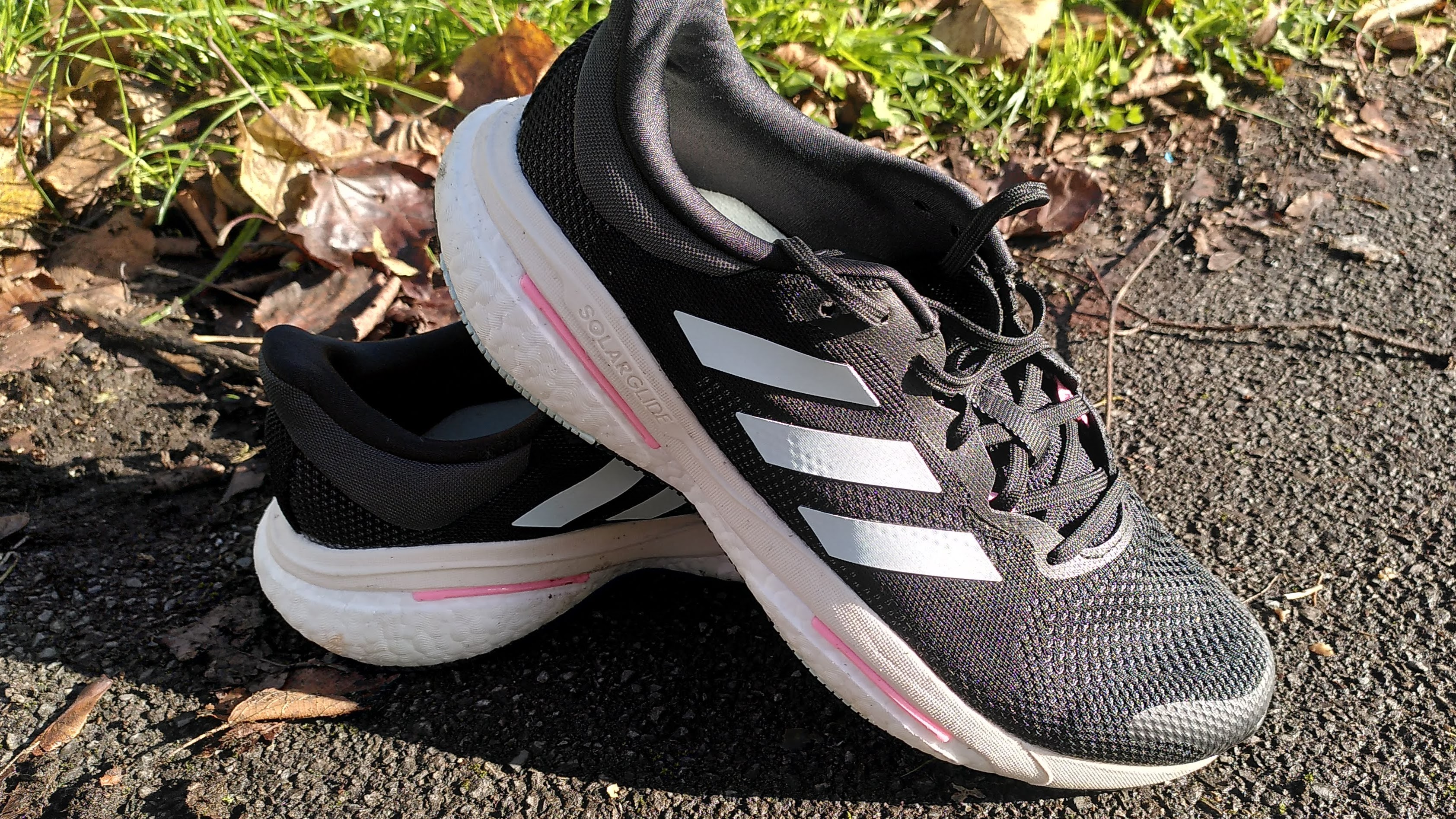
Specifications
Reasons to buy
Reasons to avoid
Like the Saucony Endorphin Speed 3, the Adidas Solarglide 5 has a plastic plate embedded in the midsole to put a spring in your step (in fact, turn the shoe over and you can see it through a gap in the outsole). It's less flashy than the Speed 3, and more of an everyday training shoe with a little extra kick.
The plate doesn't run through the whole foot, instead extending from the midfoot to the heel, so the shoe isn't as springy on toe-off, but it still feels great. If you don't like the rigidity of a full plate, it's a good halfway house.
During our test runs, we appreciated the slightly outsized midsole profile, which gives extra stability, plus the generous layer of Continental rubber on the outsole. Adidas has chosen to spend a few extra grams for improved grip and durability, and the result is a shoe that can withstand heavy use, and is a practical option for everyday training sessions, providing "just a little bit of extra pep" according to our expert tester.
Best of all, with the newer Solarglide 6 now on the market, you can usually get these excellent runners at a reduced price.
Read our full Adidas Solarglide 5 review
The best road running shoe for short runs
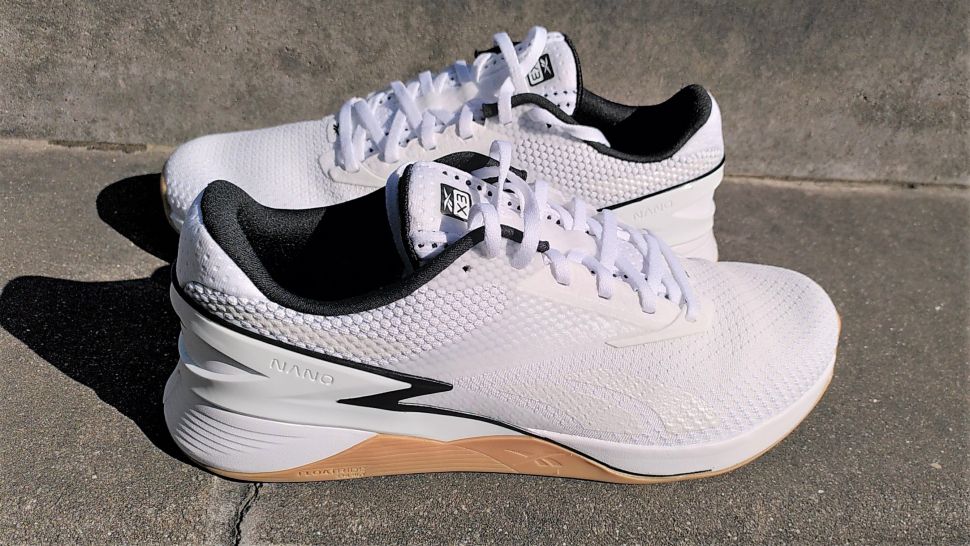
Specifications
Reasons to buy
Reasons to avoid
A super versatile training shoe with roots in Crossfit, the Reebok Nano X3 is ideal for strength and agility workouts indoors and out, plus runs up to about 5k. It isn't as rugged as the X2 Adventure, which was made with more slippery surfaces in mind, and would be a better choice if your weekly training sessions involve burpees and lunges on wet grass thanks to its outsole lugs and reinforced upper.
The Nano X3 is the latest instalment in Reebok's series of all-purpose workout shoes, designed to handle HIIT sessions in the gym and pavement alike – and Crossfit in particular. It's not a road running shoe per se, but will also serve you well for shuttle runs and training sessions of around 5km of so thanks to its versatile shape.
It's a tricky balance to strike, providing enough cushioning to handle the impact of running and jumping, while remaining stable enough for weight training. but this third-generation shoe handles it well. While it does pack some of Reebok's Floatride Energy foam in the midsole, it's used sparingly.
Read our full Reebok Nano X3 review
The best road running shoe for long runs
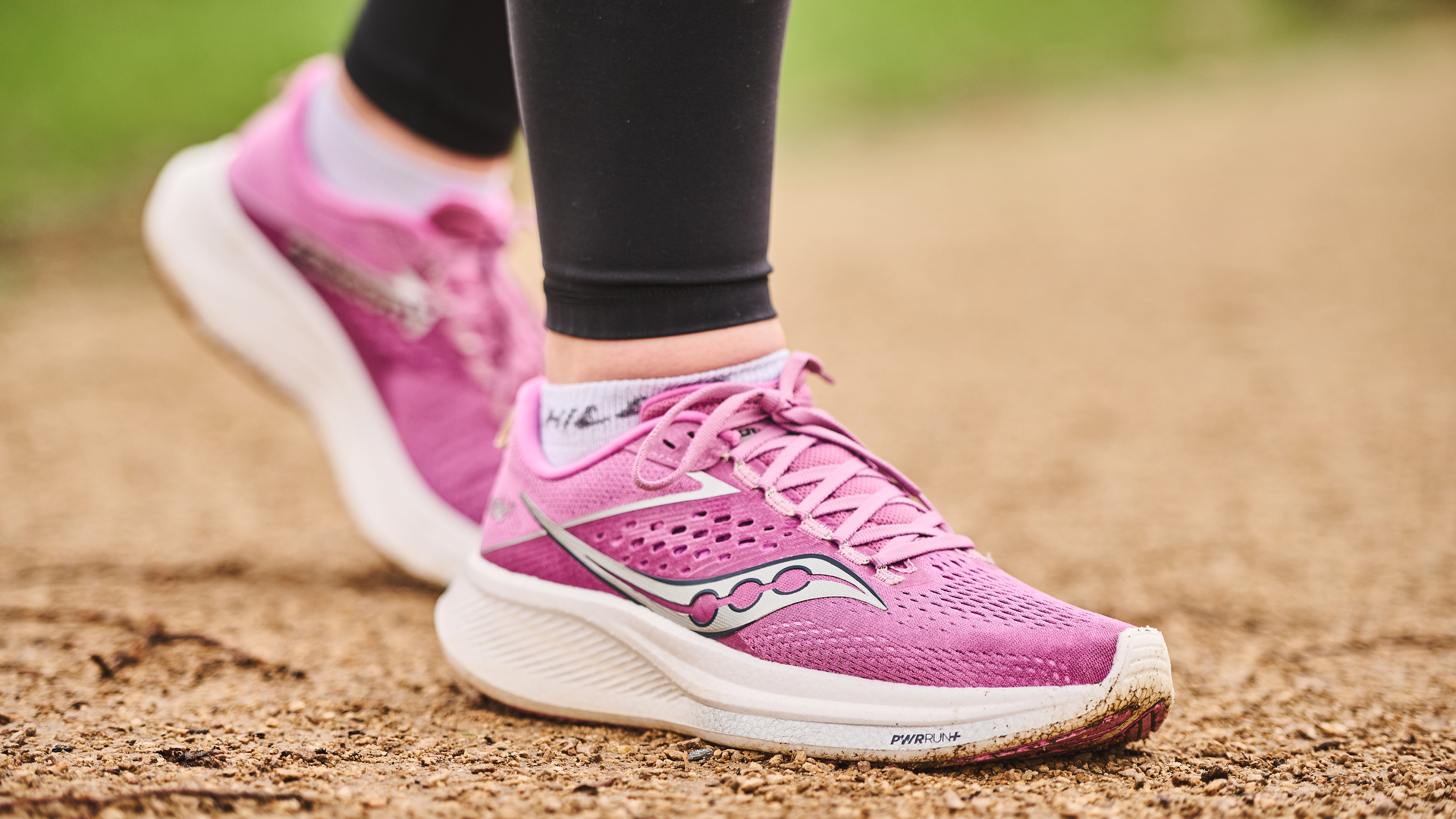
Specifications
Reasons to buy
Reasons to avoid
The Saucony Ride 17 is a neutral road shoe that's great for long, steady runs thanks to its generous (but not excessive) springy midsole foam, super smooth sock liner to prevent blisters, and a tough rubber outsole. Our reviewer wore them for marathon training, and after 100+ miles, the sole was only just starting to show signs of wear, despite regular use on rough gravel.
Our tester thoroughly enjoyed her time with the Ride 17, calling it "an extremely comfortable shoe, with just the right amount of cushioning; soft enough to provide a little welcome bounce, but not enough to feel unstable at low speeds."
The biggest drawback for the Saucony Ride 17 is the lacing system, which uses a piece of reinforced webbing, stitched at 1cm intervals, rather than regular eyelets. It seems like a good idea to shave off a gram or two, but the material has a tendency to wear. Our reviewer's sample started to fray during testing, and one of our colleagues on Coach accidentally snapped it. Make sure you go easy when tightening them, and you'll have a great time putting in the miles.
Read our full Saucony Ride 17 review
The best road running shoe for women
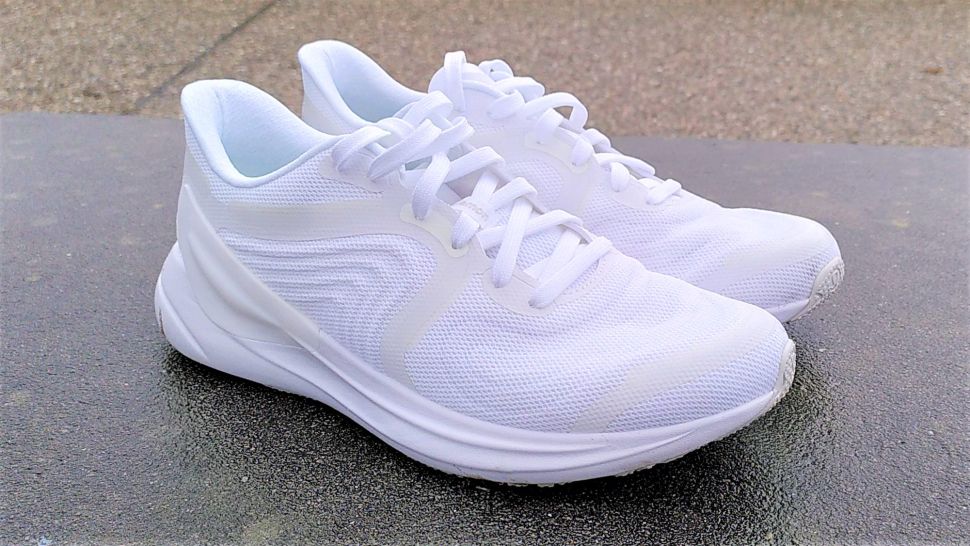
Specifications
Reasons to buy
Reasons to avoid
The Lululemon Blissfeel 2 is the company's second take at building a neutral road running shoe specifically based on female anatomy. Unlike some women's shoes, it comes in an impressive range of sizes, from 5-12 (US) including half sizes.
It's an everyday shoe, built with short to middle-distance runs in mind, and it well suited to distances of 10k or so. At 276g (9.7oz) for a women's US size 8 it's not exceptionally light, but you get plenty of comfort in exchange.
The upper is made from a layered, seamlessly engineered mesh material. It comes in a wide array of tasteful colors, like the white shown here, plus some zesty options like solar orange.
The tongue is minimally padded, and although it's not gusseted, it's wide enough to keep out the majority of grit and dirt. This is a shoe designed with heel strikers firmly in mind. There's a 9.5mm heel drop and the heel has an oversized crash pad for shock absorption and stability. The outsole rubber has been positioned and patterned to maximize grip in high impact areas. It also extends up a little over the toe, offering some extra protection for the soft upper, which is a nice addition to a road shoe.
Read our full Lululemon Blissfeel 2 review
The best budget road running shoe
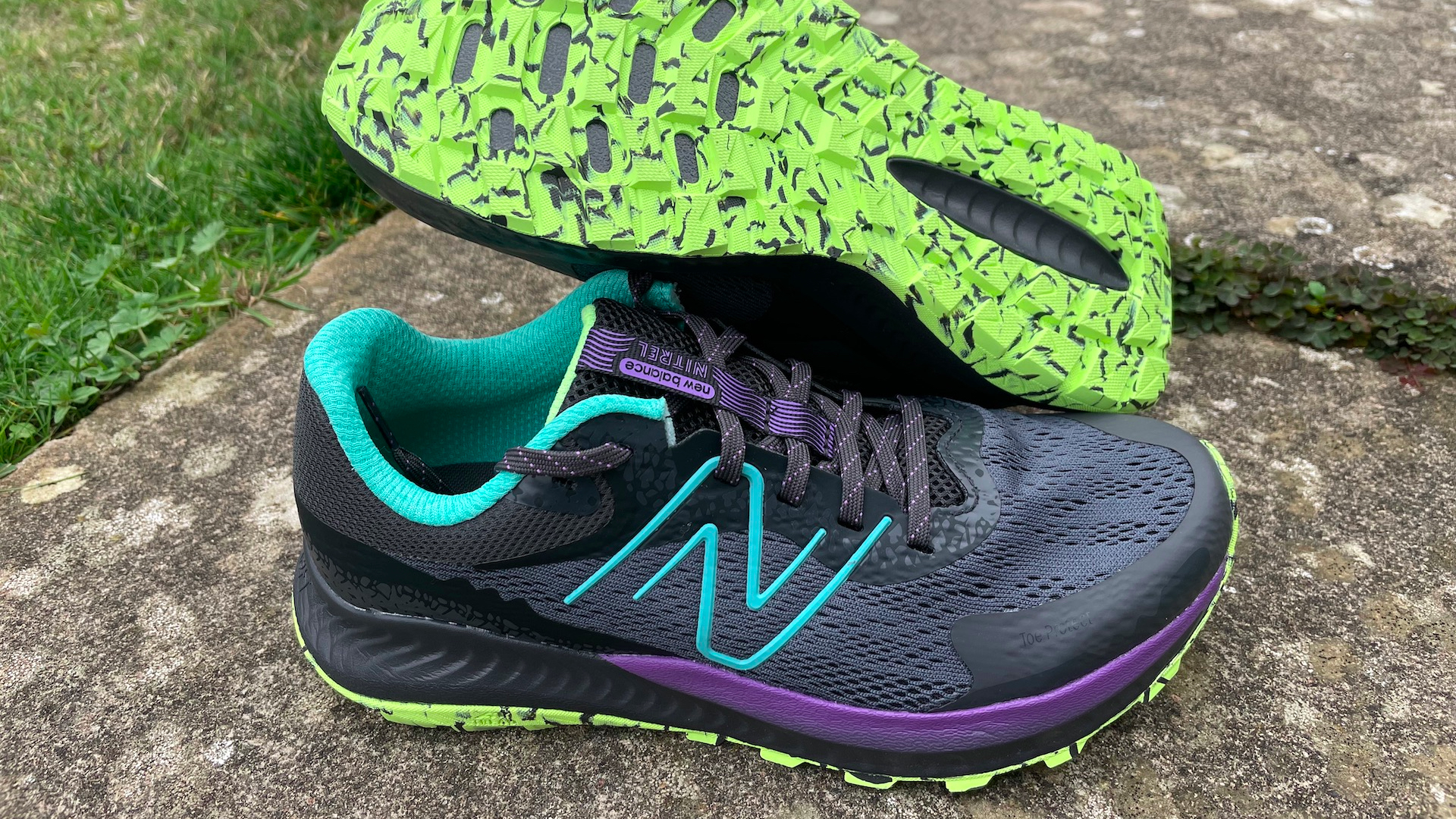
Specifications
Reasons to buy
Reasons to avoid
"A fanastic pair of road and trail running shoes that are comfy right out of the box," says our trail running expert Claire Maxted. Great quality road running shoes don't have to break the bank, as the New Balance Dynasoft Nitrel 5 demonstrates. Light and flexible, it's a good choice for runners who don't get along with thick, maximalist soles and prefer to stay more in touch with the ground beneath their feet.
The Dynasoft Nitrel 5 is versatile too, with chunky tread on the outsole that provides traction if your training takes you from road to trail, and back again. It's not as robust as the Reebok Floatride Energy 4 Adventure, but will serve you well for a little occasional off-roading.
We found that this shoe came up a little short, so it's worth ordering half a size up to ensure a comfortable fit, but the toebox is nice and wide to allow your foot to spread naturally. It's not the absolute cheapest road running shoe around (check out our guide to the best cheap running shoes for more options) but for a modest budget it's a great pick.
Read our full New Balance Dynasoft Nitrel V5 review
The best road running shoes comparison table
Shoe | List price | Weight | Drop | Colors |
Hoka Solimar | $125 (US) / £105 (UK) | 6.7oz / 190g (average women's) | 6mm | Black/white, festival fuchsia/butterfly, blanc de blanc/blue glass and more |
Hoka Mach 5 | $140 (US) / £130 (UK) | 8.1oz / 229g (UK women's 9) | 5mm | Yellow, blue, white and more |
Saucony Endorphin Pro 3 | $225 (US) / £210 (UK) | 7.4oz / 210g (US women's 11) | 8mm | Pink, black, white |
Hoka Bondi 8 | $165 (US) / £145 (UK) | 311g / 10.9oz (US men's 9) | 4mm | Amber, gray, blue |
Saucony Endorphin Speed 3 | $170 (US) / £165 (UK) | 8.11oz / 230g (US women's 11) | 8mm | Pink, black, blue |
Adidas Solarglide 5 | $45 (US) / £74.40 (UK) | 12.6oz / 357gm | 10mm | Black, white, gray and more |
Reebok Nano X3 | $140 (US) / £110 (UK) | 12oz / 340g (UK size 9) | 7mm | Future White, Core Black, Hunter Green and more |
Saucony Ride 17 | $140 (US) / £135 (UK) | 9.9oz / 282g (average men's) | 8mm | Black, gray, yellow, pink and more |
Lululemon Blissfeel 2 | $148 (US) / £138 (UK) | 9.7oz / 276g (US 9) | 9.5mm | Black, white, raw linen, solar orange and more |
New Balance Dynasoft Nitrel V5 | $74.99 (US) / £90 (UK) | 17.9oz / 508g (UK women's 6.5) | 8mm | Men’s: black, red, white; Women’s: black, gray, white |
How we test the best road running shoes
Our reviewers test road running shoes on various kinds of runs, including long training runs on tarmac, races, track sessions and park runs. Specific features (including grip, foot support, toe and heel protection, cushioning, breathability, materials used and general comfort) are tested against claims made by the brand, and we assess factors such as durability, environmental impact and value for money.
Meet the testers

Cat is the editor of Advnture, She’s been a journalist for 15 years, and was fitness and wellbeing editor on TechRadar before joining the Advnture team in 2022. She’s a UK Athletics qualified run leader, and in her spare time enjoys nothing more than lacing up her shoes and hitting the roads and trails (the muddier, the better), usually wearing at least two sports watches.

Julia Clarke is a staff writer for Adventure.com. She is an author, running enthusiast and yoga teacher who loves hitting the tarmac and trails in her native Sctoland. She recently returned to her hometown of Glasgow, after 20 years living in the USA, 11 of which were spent running in the rocky mountains of Vail, Colorado where she owned a boutique yoga studio and explored the west's famous peaks and rivers.
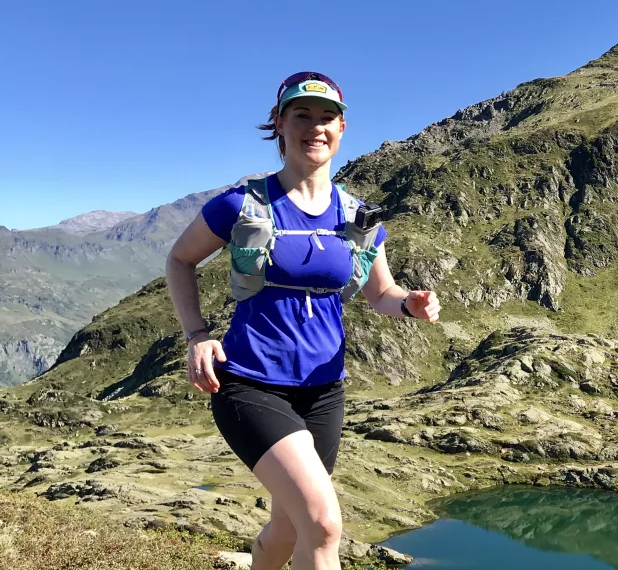
The co-founder and former editor of Trail Running magazine, Claire now runs the YouTube channel Wild Ginger Running, creating films packed with trail- and ultra-running content. An award-winning journalist, writing for outdoor and adventure sports magazines and websites, her first book The Ultimate Guide to Trail Running 5k to 50k is out in January 2021. Claire also speaks and presents at events and races.
How to choose the best road running shoes
The best road running shoes for you will depend on the kind of running you intend to do. If tarmac is your thing, then you’ve come to the right place. Trail runners are better served by the grip offered by trail running shoes, while something between the two, such as inov-8’s Parkclaw G 280, is best if your training mainly takes place in urban parks.
Even among road running shoes, there are significant differences. Some shoes are designed for comfort over long distances, others are crafted with shorter races in mind. To help you navigate this and find the pair for you, we’ve compiled some of the most frequently asked questions to do with choosing the best road running shoes…
What’s the difference between a race shoe and a normal running shoe?
A race shoe is typically lighter and is crafted for speed over durability. The midsole is designed to propel your foot forwards with maximum efficiency. It often contains a lightweight, rigid carbon-fiber plate, which levers the foot forward. As well as this, many of the latest race shoes contain superfoams, which provide additional bounce but have a tendency to wear away relatively quickly. We think the Saucony Endorphin Pro 3 is a great shoe for race day, though every runner is different and everyone has their own preferences.
A standard running shoe is designed for maximum comfort over long distance and is usually cushioned to absorb the shock of each impact. This reduces the risk of injury during training runs. They’re also more durable than racing shoes.
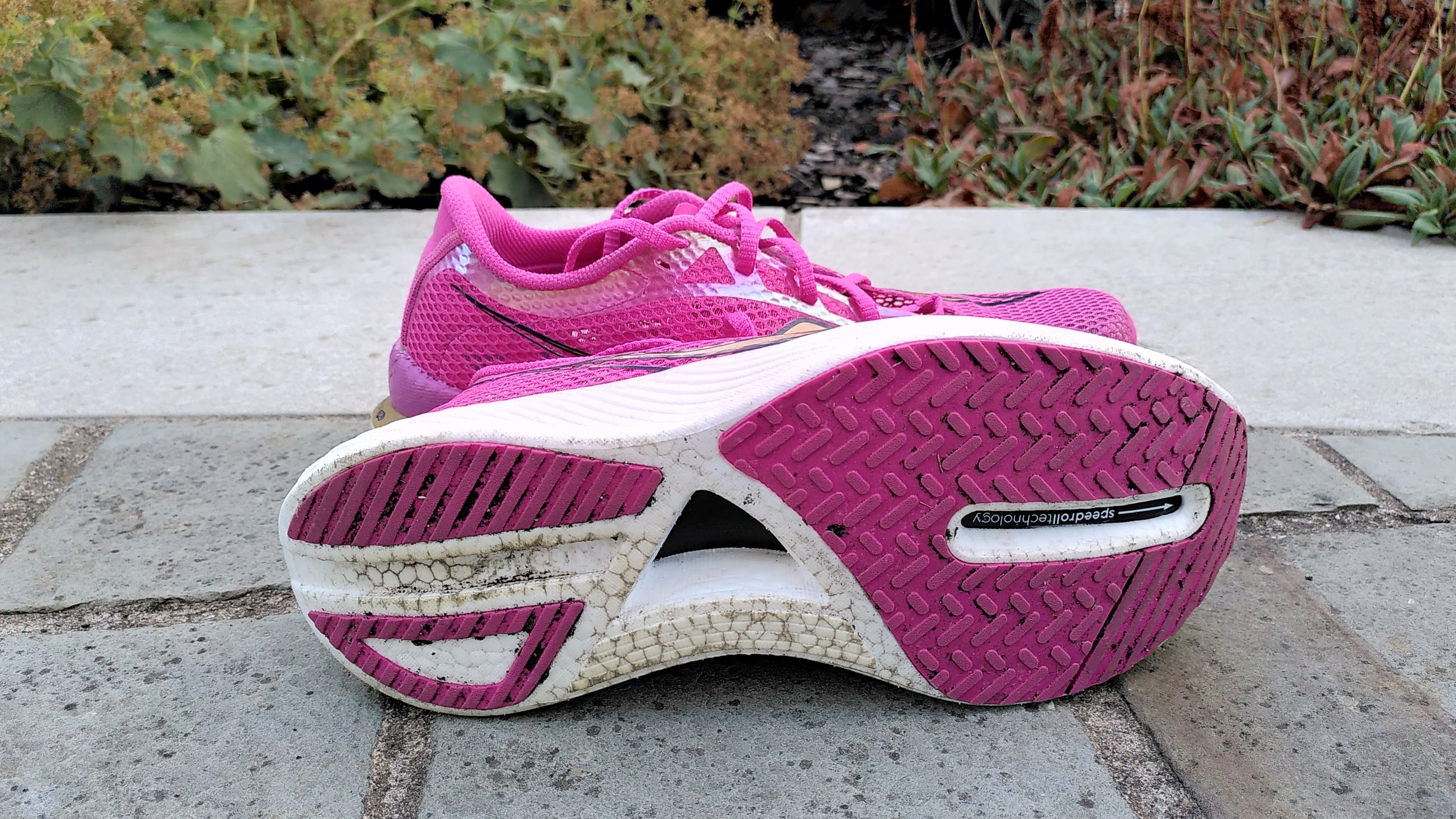
Should I get my gait analyzed?
If you’re new to running, it’s definitely worth getting your gait analyzed. In a nutshell, your gait describes the way your foot strikes the ground and there are broadly three varieties: neutral, overpronating and underpronating.
Neutral runners tend to have high arches and strike the ground in a balanced manner.
An overpronating runner’s foot rolls inward, which puts stress on the alignment of the body. These kinds of runners tend to have low arches or flat feet and require shoes that correct this, giving the ankle more stability.
Underpronation – often also called supination – is the least common kind of gait. This is when the foot rolls outwards with each impact, decreasing the amount of shock absorption. If you underpronate, it’s worth getting a lightweight running shoe with a decent amount of cushioning.
So, it’s vital to choose the right kind of running shoe for your personal gait for comfort and in order to avoid injury.
What does drop mean in a running shoe?
The drop is the difference in height (in millimeters) between the heel and the forefoot in a running shoe. The larger the drop, the higher the heel is elevated above the forefoot.
Runners tend to naturally strike the ground with different parts of the foot. The majority are heel-strikers, requiring a drop of around 6mm or more to match their natural stride. Runners who impact the ground with the forefoot or the midfoot are better catered for by running shoes with a drop of less than 6mm.
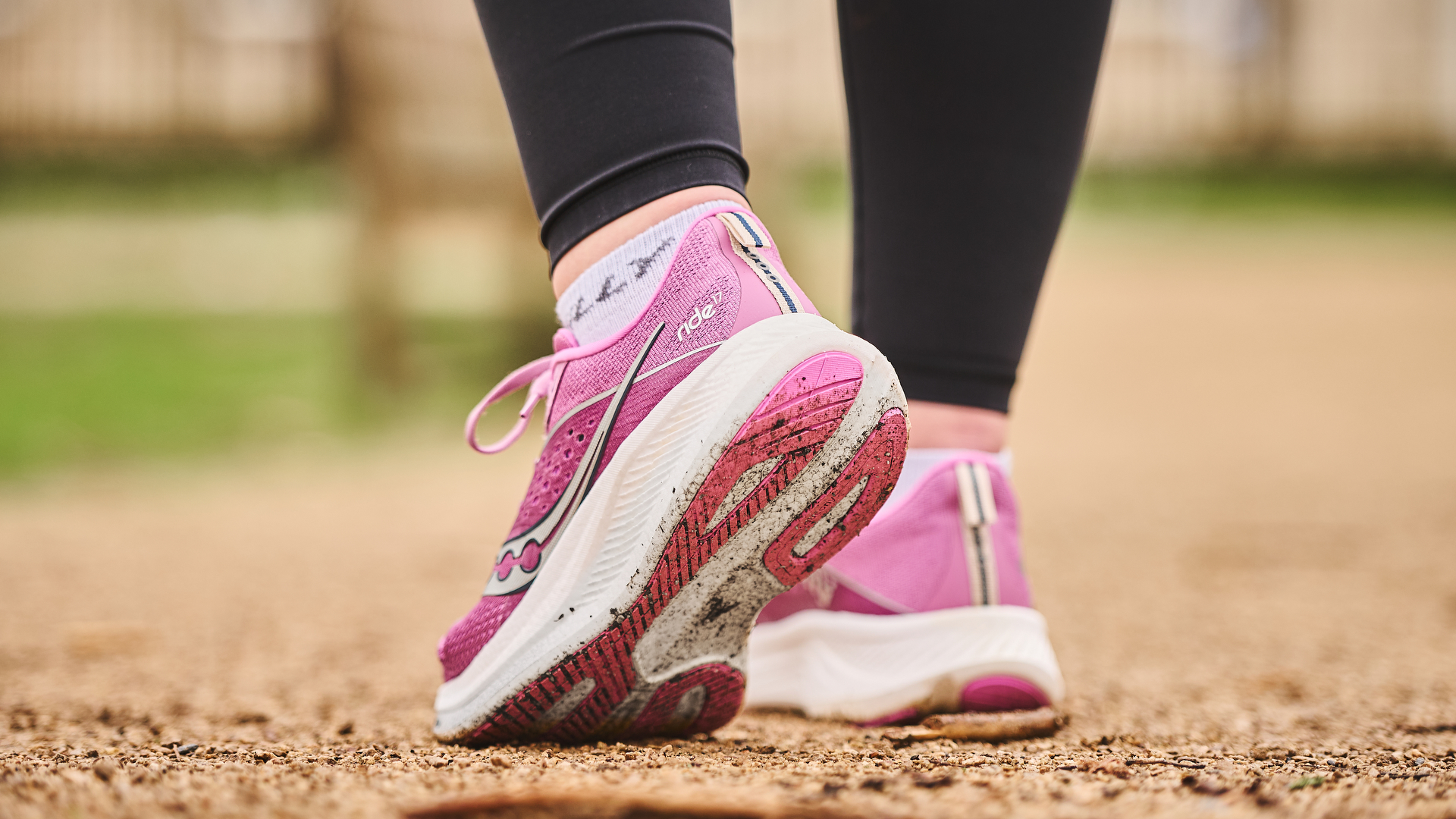
Should I stick to my normal shoe size when buying road running shoes?
When running, feet move around much more than during everyday walking. As well as this, they can swell up during long runs. With this in mind, it’s always going up between half a size or a full size from your usual. It’s also worth checking reviews to see if certain running shoes size a little small or large, before purchasing.
Advnture Newsletter
All the latest inspiration, tips and guides to help you plan your next Advnture!

Cat is the editor of Advnture, She’s been a journalist for 15 years, and was fitness and wellbeing editor on TechRadar before joining the Advnture team in 2022. She’s a UK Athletics qualified run leader, and in her spare time enjoys nothing more than lacing up her shoes and hitting the roads and trails (the muddier, the better), usually wearing at least two sports watches.
